How JobsOhio Hides in Plain Sight, And How You Can Beat the Secrecy

By Aaron C. Knapp
Investigative Journalist and Civic Accountability Advocate
AaronKnappUnplugged.com
“Be lawful, not awful.”
When the State Builds a Wall, Build a Ladder
On its face, the Ohio Supreme Court’s latest ruling on JobsOhio seems like another victory for government secrecy.
In a short two paragraph opinion, the Court declared that JobsOhio, the state’s private nonprofit economic development partnership, is exempt from Ohio’s Public Records Act. That ruling might feel like a dead end for transparency. But those of us who work with the law know that direct access is never the only access.
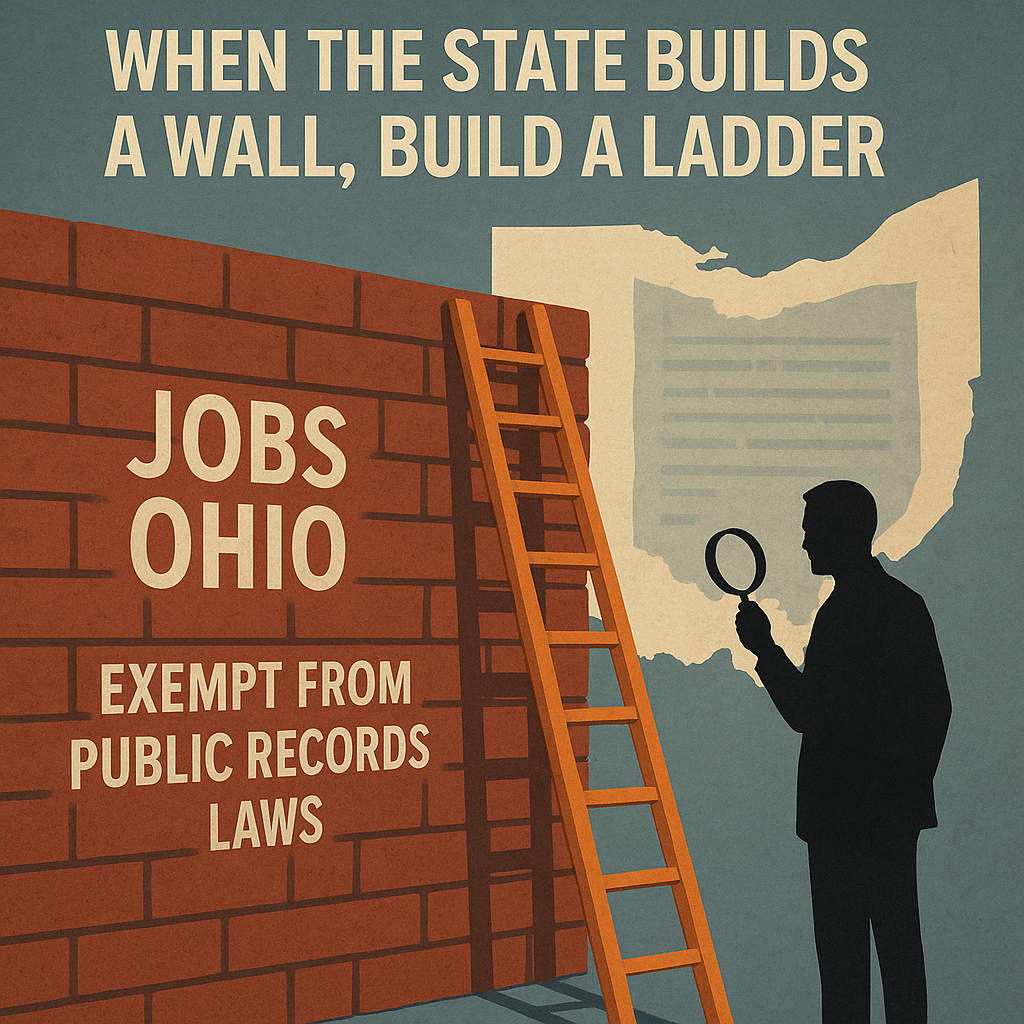
Even if JobsOhio itself can refuse records requests, the government agencies it works with cannot.
That is the legal key. That is the work around. That is how investigative journalists, watchdogs, and citizens can still enforce accountability even when the state attempts to wall off the truth.
The Two Paragraph Ruling That Was Not the Final Word
In Ullman v. JobsOhio, the Court made three key points:
1. JobsOhio is exempt from the Public Records Act under its enabling statute.
2. A mandamus action cannot force JobsOhio to produce records.
3. The ruling does not decide whether JobsOhio is constitutional.
So yes, as written:
“JobsOhio is specifically exempted from the requirements of R.C. 149.43.”
Ohio Supreme Court Opinion, 2025
But that is not the end of the road. It is simply a detour.
JobsOhio Does Not Work Alone, And That Is Its Weakness
JobsOhio cannot unilaterally approve a tax credit. It cannot authorize a road extension. It cannot write a zoning change. It cannot sign an appropriation check.
Instead, JobsOhio coordinates.

It works with:
Ohio Department of Development
County Commissioners
Local economic development offices
Port Authorities
Team NEO and regional partners
The Tax Credit Authority
State budget and legal offices
City councils and mayors
Every single time JobsOhio engages in a development deal, paperwork flows through public inboxes, public calendars, public minutes, and public servers.
And that is where the law applies.
“A public record does not cease to be public simply because it originated with a private entity.”
State ex rel. Cincinnati Enquirer v. Hamilton County, 75 Ohio St.3d 374 (1996)
If a public office receives a document, it becomes public under Ohio law. If a government official sends an email, text, memo, or draft agreement, that record must be produced, even if it involves JobsOhio.
Why This Matters: The New Russia Township Example
The latest proof is unfolding in our own backyard.
JobsOhio, through its partner Team NEO, has been quietly promoting a major “megasite” concept in New Russia Township. Rumors suggest it could involve thousands of acres, farmland consolidation, and a transformation of the township landscape.
But when citizens tried to request documents directly from JobsOhio, they were blocked by the exemption.
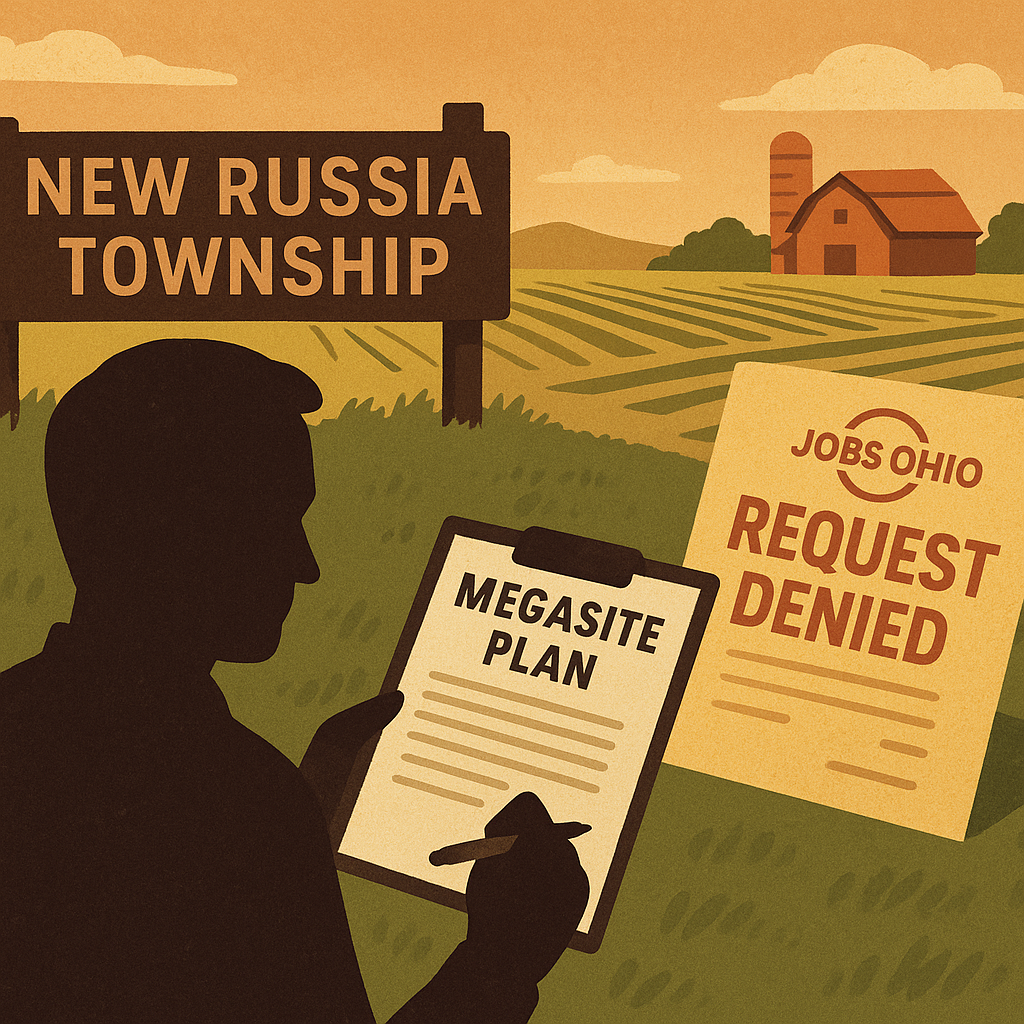
The workaround: request the same documents from the County Commissioners, Port Authority, Township Trustees, or the Ohio Department of Development.
The key is understanding that once JobsOhio sends anything to a public office, it becomes a public record in their hands.
For example, you can request:
All emails sent to or from county commissioners that include a @jobs-ohio.com or @teamneo.org address
Any attached feasibility studies, maps, renderings, or consultant reports that reference the New Russia Township site
Meeting minutes from Port Authority board meetings where the deal was discussed
Internal memos or staff notes referencing the megasite
You are not asking JobsOhio. You are legally compelling the intermediaries.
This Is Not Just About Development, It Is About Accountability
This access strategy is not new to me. It is exactly how I proved that Chief James McCann misused government email to pursue a retaliatory complaint against me in 2023.
The licensing board said I could not request my own complaint. They cited confidentiality laws. But once I requested McCann’s government emails, I got the file, because he had forwarded it to an outside agency. That made it public.
JobsOhio cannot hide forever. Neither can McCann. Not as long as they send or receive documents through government offices.
The Work Around For JobsOhio Transparency
Here is the guide, in plain language:
1. Do not request records from JobsOhio. They are exempt.
2. Identify every public entity that partnered with JobsOhio on the project.
3. Request all emails, attachments, texts, and documents sent to or received from JobsOhio or Team NEO.
4. Cite R.C. 149.43(b)(1), requiring prompt disclosure of any record a public office creates or receives.
5. Quote Cincinnati Enquirer v. Hamilton County if they claim JobsOhio is protected.
6. If denied, file with the Ohio Court of Claims under R.C. 2743.75.
You can run, But you shouldn’t hide.
“JobsOhio can hide its own records but not the ones it hands to government.”
Final Thoughts: Secrecy Is a Strategy, Not a Right
JobsOhio is the apex of Ohio’s public private shadow governance model. It moves public money without public scrutiny. It makes deals behind closed doors. It relies on others to sign off, so it can keep its hands clean.
But at every step, they leave a public footprint.
The law gives us the right to follow that trail.
You do not have to accept secrecy. You only have to work around it. And that is not just a loophole. It is the heart of accountability.
Need help drafting a request?
I have filed hundreds and can write the exact language to pull records from any government entity working with JobsOhio, including county offices, boards, and development agencies.
Be lawful, not awful.
By Aaron C. Knapp
Investigative Journalist and Civic Accountability Advocate
AaronKnappUnplugged.com
“Be lawful, not awful.”
Sample PPR:
PUBLIC RECORDS REQUEST TEMPLATE (JobsOhio Workaround)
[Your Name]
[Your Address]
[City, State ZIP]
[Email Address]
[Date]
[Public Office Name]
[Records Custodian or Department if known]
[Agency Address]
RE: Public Records Request under R.C. 149.43 – JobsOhio/Team NEO Communications
To the Records Custodian:
Pursuant to Ohio Revised Code 149.43, I am submitting this public records request for the following records:
1. **All emails, text messages, calendar entries, memos, or written correspondence between any employee, officer, or representative of [AGENCY NAME] and any representative of JobsOhio or Team NEO from January 1, 2022 to the present.**
This includes but is not limited to communications sent to or received from any email addresses ending in:
- “@jobs-ohio.com”
- “@teamneo.org”
- Or any known email domain used by JobsOhio contractors or economic development staff.
2. **All attachments to the above communications**, including draft agreements, memoranda, feasibility studies, performance loans, maps, site assessments, infrastructure proposals, or incentive packages related to any JobsOhio-supported or Team NEO-supported project located within [GEOGRAPHIC AREA, e.g., New Russia Township / Lorain County].
3. **Any meeting minutes, notes, summaries, or agenda items referencing JobsOhio, Team NEO, or statewide development incentives related to [PROJECT NAME or LOCATION, if known].**
4. **Copies of any grant agreements, tax incentive applications, or submission materials shared with or received from JobsOhio or Team NEO in connection with the [PROJECT NAME or SITE].**
Please produce these records in electronic format if possible. If you believe any portion of this request is exempt from disclosure, please cite the specific statutory basis for each claimed exemption and provide the non-exempt portions in accordance with R.C. 149.43(B)(1).
For clarification, this request targets <strong>records created or received by your office</strong>. It does not seek records held by JobsOhio itself. Records received from private entities become public records when in the possession of a public office, pursuant to <em>State ex rel. Cincinnati Enquirer v. Hamilton County</em>, 75 Ohio St.3d 374 (1996).
Please respond within a reasonable period as defined by law. I am willing to clarify this request if needed to expedite fulfillment and minimize burden.
Thank you for your prompt attention.
Sincerely,
[Your Name]
Quick Notes for Efficient Use:
- Replace
[AGENCY NAME],[GEOGRAPHIC AREA], and[PROJECT NAME]with specifics like “Lorain County Commissioners,” “New Russia Township,” or “Midway Mall Redevelopment.” - If you want to sound more formal, you can add:
"This request is not required to be in any particular form per Ohio law." - If they push back or stall, send a simple reply:
"Please cite the statutory exemption you're relying on, per R.C. 149.43(B)(3)."
You can file multiple versions of this with different agencies — county development offices, port authorities, city councils, the state Department of Development, or the Ohio Tax Credit Authority.



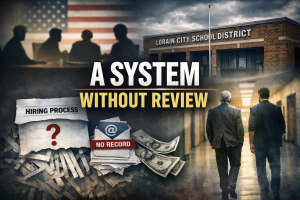

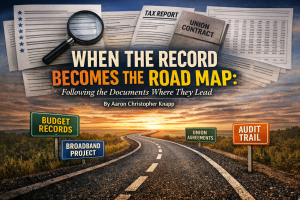
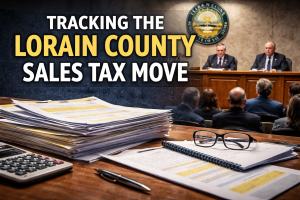
How can I let people know? This isn’t shareable. Thanks for the hard work. They want to ruin our countryside. I’m sick of it. They let so many buildings in downtown rot away. Beautiful houses gone. I could go on and on.
You should be able to copy the URL at the top of page to share.